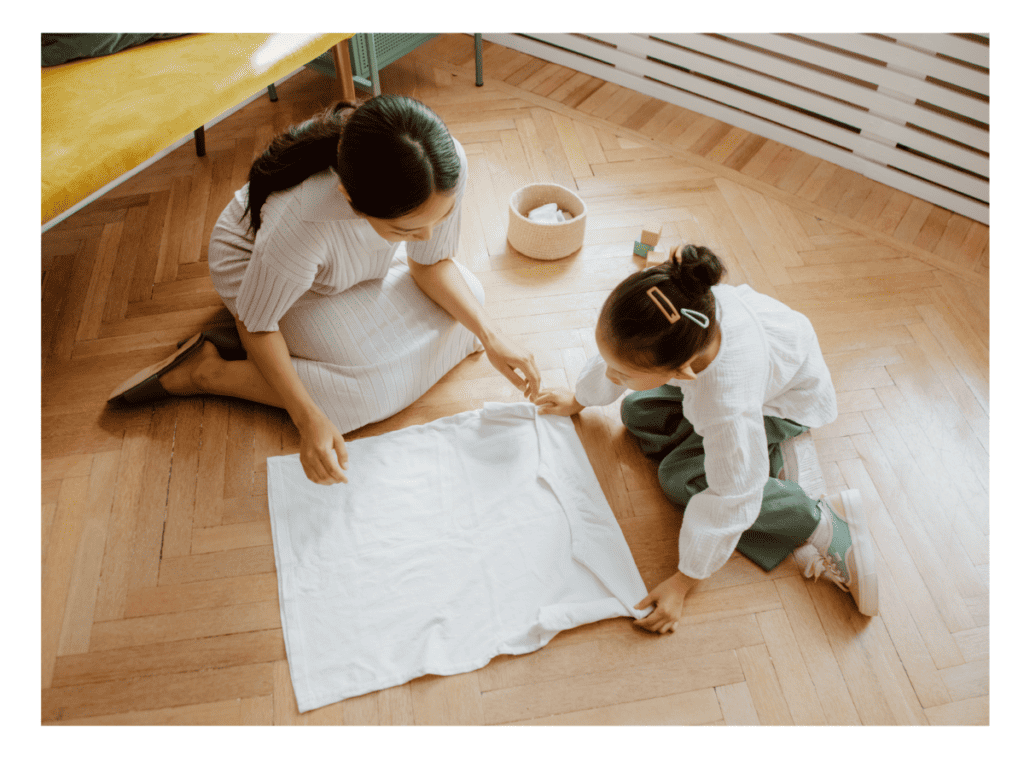In my role as a school-based occupational therapist, my focus revolves around supporting students in enhancing their organizational skills. This includes establishing effective systems to help them organize their desks and book bags. Additionally, I work on educating students, particularly those in life skills programs, on essential everyday tasks. These tasks encompass activities of daily living (ADLs), such as dressing, oral hygiene, and toileting. Moreover, I teach them how to perform instrumental activities of daily living (IADLs), including tasks like preparing basic meals, folding clothes, and managing light household chores. My aim is to empower students to become self-sufficient by performing these routines and fostering a sense of independence in their daily lives.
House chores, for some people, are a time for deep introspection. A time to meditate about life to distract from pondering thoughts while playing music in the background. Or simply a dreadful activity disguised as a workout routine. Regardless of what your take is on household chores, they are routine activities we need to perform to keep our living environment clean, organized, and functional.
In the midst of our bustling lives, the prospect of tackling household chores can feel like a daunting challenge. Modern family dynamics are characterized by a multitude of commitments and obligations, leaving us with little time for anything else. As a mom or a caregiver, this sentiment likely resonates with you. Balancing not only your own schedule but also juggling your children’s, which includes your husband’s, by the way. Coordinating this myriad of obligations and commitments is no small feat. It’s a reality that many of us can relate to and understand firsthand.
You might be wondering, “How can we make time for household chores amidst our busy lives?” The solution is surprisingly simple: involving the entire family. As a mother, you are the brains and the linchpin of your household. You are the glue that keeps all the pieces together, my wife is going to love this post!!! However, this does not mean that you should serve as judge and executioner.
You might be wondering, “How can we make time for household chores amidst our busy lives?” The solution is surprisingly simple: involving the entire family.
Trust me, this will not harm your children; instead, it will help them develop mentally, physically, and emotionally. As a matter of fact, The American Academy of Child and Adolescent Psychiatry states that Children who do chores may exhibit higher self-esteem, be more responsible, and be better equipped to deal with frustration, adversity, and delayed gratification. These skills can lead to greater success in school, work, and relationships. If you’d like to learn more about this study, you can click HERE.
How House Chores Develop Fine Motor Skills

House chores such as folding clothes and emptying a dishwasher are examples of routine activities children can assist with around the house to help them develop fine motor skills. They are manual activities requiring dexterity, coordination, and strength for their execution. Therefore, when children engage in these activities, they develop the gross motor foundation to support fine motor skills and hone the skills necessary to manipulate objects or perform tasks with precision. If you.
For instance, let’s break down the activity of folding clothes into its components to learn how this simple activity can provide children an excellent opportunity to grow their fine motor skills. We will begin this activity by removing clothes from the dryer; children will need to be able to grab onto the door handle and pull from it, which requires strength and ability to grasp.
Children will then need to reach inside the dryer and pull out the clothes items by practicing grasping and voluntary release onto the basket. Once all the clothes are in the basket, they will need to carry it or assist a grown-up in taking it to where the clothes will be folded, requiring power grasp, arm-hand movement, and upper body strength.
It takes a lot of upper body strength when folding clothes, which is an excellent way to promote muscle growth. As kids take clothing items from the basket, they need to hold them up with both hands, working also on bilateral coordination. As they place them on a flat surface and begin to fold, they practice pincer grasp, power grasp, crossing midline, and eye-hand coordination. The more pieces of clothes they fold, the more they practice and improve their skills; “practice makes perfect.”
If your children have never done this activity before, it might be frustrating for some to get the folds right. Fortunately, there are multiple ways to simplify the activity, from products on the market to DIY hacks to help children successfully fold clothes.
What Are The Best Chores For Fine Motor Development

All house chores are good for helping kids develop their fine motor skills. However, some require a heavy emphasis on manual dexterity and prehension. This is a partial list of chores; depending on your social and cultural background, house chores may differ from those listed below.
- Folding clothes
- Putting away groceries
- Fixing the bed
- Refilling bottle of hand soap
- Cleaning windows and mirrors with spray bottle
- Loading and unloading dishwasher
- Putting away Tupperware
- Sorting out Tupperware and pots
- Putting away and sorting out utensils
- Matching socks
- Putting toys away
- Setting and clearing dining table
- Uncluttering desk
- Organizing closet
- Pulling out weeds
It is important to note that the chores we decide to have children perform should be proportional to their abilities and safety awareness. At the same time, children should be supported in performing these tasks regardless of how harmless they might seem. Supervision is not only good for safety reasons but also to ensure that they learn to perform these tasks the proper way. In addition, If we choose to have them do chores that include cleaning products, like cleaning windows and mirrors, let’s try to use products that are safe for them and good for the environment, like the ones in this link.
I hope that you have gained a better understanding of the benefits of having kids help with house chores. They are good for their fine motor skills, promote healthy self-esteem, validate their place as valued household members and as an integral part of the family structure. House chores help them improve their problem-solving skills, and they learn to be more responsible. So please do not feel like running your house should be a one woman show; instead, share some of those responsibilities with your kids, and you won’t regret it.
Company Motto: “Empowering our children goes a long way in helping them become independent and build their self-esteem.”
